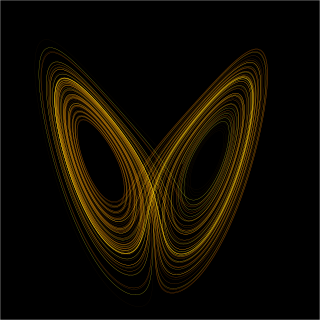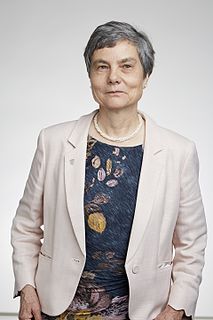This page is based on this
Wikipedia article Text is available under the
CC BY-SA 4.0 license; additional terms may apply.
Images, videos and audio are available under their respective licenses.

In mathematics, a dynamical system is a system in which a function describes the time dependence of a point in a geometrical space. Examples include the mathematical models that describe the swinging of a clock pendulum, the flow of water in a pipe, and the number of fish each springtime in a lake.
In physics, a dynamical system is said to be mixing if the phase space of the system becomes strongly intertwined, according to at least one of several mathematical definitions. For example, a measure-preserving transformation T is said to be strong mixing if
In mathematics, mixing is an abstract concept originating from physics: the attempt to describe the irreversible thermodynamic process of mixing in the everyday world: mixing paint, mixing drinks, etc.

Yakov Grigorevich Sinai is a mathematician known for his work on dynamical systems. He contributed to the modern metric theory of dynamical systems and connected the world of deterministic (dynamical) systems with the world of probabilistic (stochastic) systems. He has also worked on mathematical physics and probability theory. His efforts have provided the groundwork for advances in the physical sciences.
In mathematics, the multiplicative ergodic theorem, or Oseledets theorem provides the theoretical background for computation of Lyapunov exponents of a nonlinear dynamical system. It was proved by Valery Oseledets in 1965 and reported at the International Mathematical Congress in Moscow in 1966. A conceptually different proof of the multiplicative ergodic theorem was found by M. S. Raghunathan. The theorem has been extended to semisimple Lie groups by V. A. Kaimanovich and further generalized in the works of David Ruelle, Grigory Margulis, Anders Karlsson, and François Ledrappier.
In mathematics, an ergodic sequence is a certain type of integer sequence, having certain equidistribution properties.
In probability theory, a stationary ergodic process is a stochastic process which exhibits both stationarity and ergodicity. In essence this implies that the random process will not change its statistical properties with time and that its statistical properties can be deduced from a single, sufficiently long sample (realization) of the process.

Hillel (Harry) Furstenberg is an American-Israeli mathematician, a member of the Israel Academy of Sciences and Humanities and U.S. National Academy of Sciences and a laureate of the Wolf Prize in Mathematics. He is known for his application of probability theory and ergodic theory methods to other areas of mathematics, including number theory and Lie groups.
The maximal ergodic theorem is a theorem in ergodic theory, a discipline within mathematics.

Alexandra Bellow is a mathematician from Bucharest, Romania, who has made contributions to the fields of ergodic theory, probability and analysis.
In econometrics and signal processing, a stochastic process is said to be ergodic if its statistical properties can be deduced from a single, sufficiently long, random sample of the process. The reasoning is that any collection of random samples from a process must represent the average statistical properties of the entire process. In other words, regardless of what the individual samples are, a birds-eye view of the collection of samples must represent the whole process. Conversely, a process that is not ergodic is a process that changes erratically at an inconsistent rate.
Susan Mary Rees, FRS is a British mathematician and a Professor of Mathematics at Liverpool University since 2002, specialising in research in complex dynamical systems.
In quantum chaos, a branch of mathematical physics, quantum ergodicity is a property of the quantization of classical mechanical systems that are chaotic in the sense of exponential sensitivity to initial conditions. Quantum ergodicity states, roughly, that in the high-energy limit, the probability distributions associated to energy eigenstates of a quantized ergodic Hamiltonian tend to a uniform distribution in the classical phase space. This is consistent with the intuition that the flows of ergodic systems are equidistributed in phase space. By contrast, classical completely integrable systems generally have periodic orbits in phase space, and this is exhibited in a variety of ways in the high-energy limit of the eigenstates: typically that some form of concentration or "scarring" occurs in the limit.
Amie Wilkinson is an American mathematician working in ergodic theory and smooth dynamical systems. She is a professor at the University of Chicago.
Bryna Rebekah Kra is an American mathematician who works in dynamical systems and ergodic theory, and uses dynamical methods to address problems in number theory and combinatorics. She has made contributions to the structure theory of characteristic factors for multiple ergodic averages.

Caroline Mary Series is an English mathematician known for her work in hyperbolic geometry, Kleinian groups and dynamical systems.





